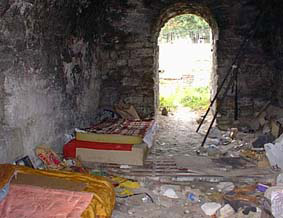Reader Response: Composer Daniel Wolf On Life In Today's Hungary
"I lived in Hungary for five years, until July of this year. You can not live in the country without witnessing the growing gap between the poorest and wealthiest portions of the population. While homeless, unemployed, underemployed, and the working poor are very much in evidence in Budapest and the well-touristed regions in the west, it is in the countryside, and critically in the Northeast of the country, that one encounters an acute structural poverty that has developed continuously since the change of systems. The inevitable opening of the EU to the Ukraine has already begun to further stress this population.
The change of systems has been particularly hard on musicians. Before, musicians were treated as professionals and paid as well (or as badly) as other professionals. While most other professions have seen some recognition of inflation in their salaries, this has not been true for musicians. A full-time orchestral player in a major ensemble may now take home little as 200 USD per month, and additional income from teaching, touring, and simultaneous "full-time" contracts is essential to survival. In addition, live gigs for musicians playing in light settings (restaurants, clubs) have become extremely rare, and this has had a particularly bad effect on musicians from the Sinti and Roma minorities."
By Daniel Wolf. Posted to Renaissance Research November 29, 2005.
http://home.snafu.de/djwolf/
*
Thank you Daniel for the very thoughtful comment. Would you care to write a Letter to the Editor of The Economist magazine? I would hope that they would publish it.
For your information, my spouse, a full-time Ukrainian senior museum curator (cultural scientist) with a major museum [Lviv's Royal Chambers -- a UNESCO listed World Heritage Property], just had her monthly salary increased from $60 a month to $85 a month, one year after the Orange Revolution. We are well aware of the pressures of now rapidly rising food, energy, clothes, and housing costs, throughout Central and Eastern Europe. [N.'s mother's pension, after a career as a doctor, is now $25 a month]. And yesterday, I did find on the Web, images of the homeless living among the Roman ruins of ancient Obuda, north of Budapest proper.
Thank you again for your comment.

"Today, watertight is good news for Obuda's homeless, who have made this their refuge. They watched us and kept their distance, letting us explore the ruins by ourselves. They returned only as we seemed to be leaving for good."
Photo and caption text credit: www.leafpile.com (With thanks)
The change of systems has been particularly hard on musicians. Before, musicians were treated as professionals and paid as well (or as badly) as other professionals. While most other professions have seen some recognition of inflation in their salaries, this has not been true for musicians. A full-time orchestral player in a major ensemble may now take home little as 200 USD per month, and additional income from teaching, touring, and simultaneous "full-time" contracts is essential to survival. In addition, live gigs for musicians playing in light settings (restaurants, clubs) have become extremely rare, and this has had a particularly bad effect on musicians from the Sinti and Roma minorities."
By Daniel Wolf. Posted to Renaissance Research November 29, 2005.
http://home.snafu.de/djwolf/
*
Thank you Daniel for the very thoughtful comment. Would you care to write a Letter to the Editor of The Economist magazine? I would hope that they would publish it.
For your information, my spouse, a full-time Ukrainian senior museum curator (cultural scientist) with a major museum [Lviv's Royal Chambers -- a UNESCO listed World Heritage Property], just had her monthly salary increased from $60 a month to $85 a month, one year after the Orange Revolution. We are well aware of the pressures of now rapidly rising food, energy, clothes, and housing costs, throughout Central and Eastern Europe. [N.'s mother's pension, after a career as a doctor, is now $25 a month]. And yesterday, I did find on the Web, images of the homeless living among the Roman ruins of ancient Obuda, north of Budapest proper.
Thank you again for your comment.

"Today, watertight is good news for Obuda's homeless, who have made this their refuge. They watched us and kept their distance, letting us explore the ruins by ourselves. They returned only as we seemed to be leaving for good."
Photo and caption text credit: www.leafpile.com (With thanks)


0 Comments:
Post a Comment
<< Home